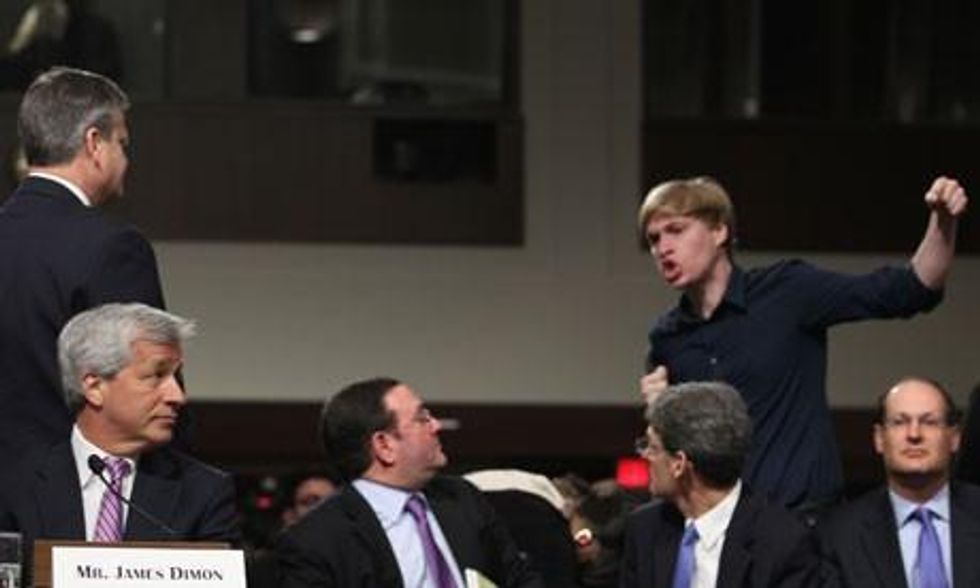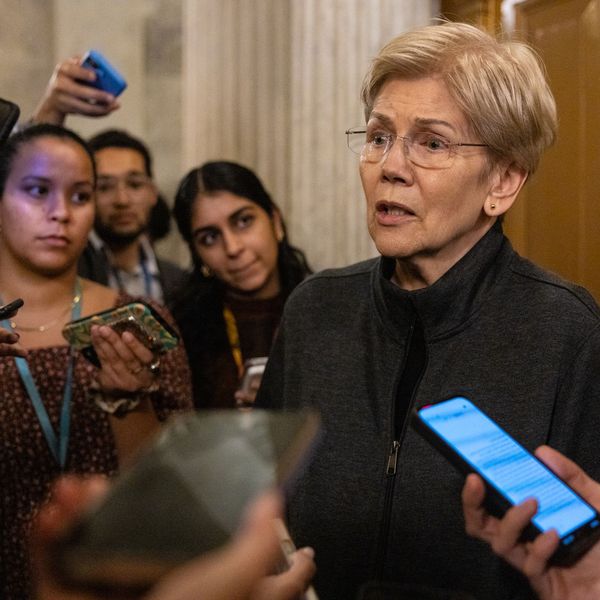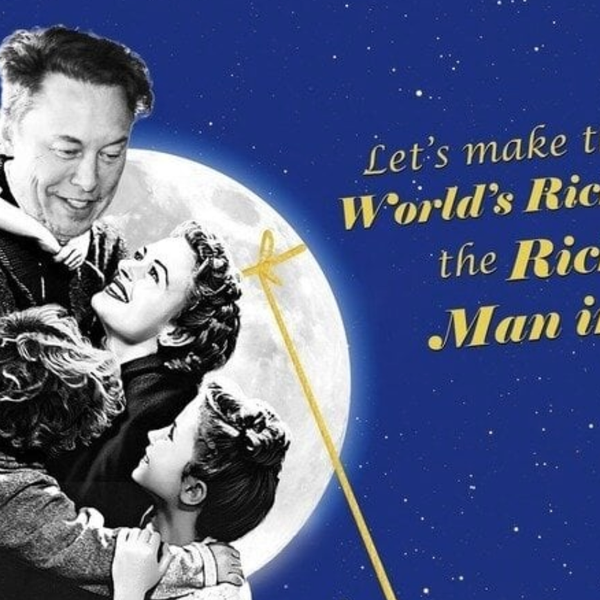Why Jamie Dimon and his Wall Street Buddies Need to Pay a Robin Hood tax
As JP Morgan CEO Jamie Dimon showed up to Congress on Tuesday to try to explain how his "too big to fail" bank could mysteriously lose $2bn in risky trades, he was suddenly diverted to a back entrance. Why?

Because Robin Hood was waiting.
Nurses, healthcare and community activists were in the hallways ready to send him and the rest of his Wall Street gang a message: it's time to pay up for the damage you have done to our communities and our nation.
This week, the Robin Hood campaign, which has exploded across the world, took a major step forward in the US with a stepped-up campaign that included visits by Robin Hood and his merry men and women to JP Morgan branches across the country, and scores of other actions. It also included the release of a new video, featuring actor/director Mark Ruffalo, musicians Tom Morello and Chris Martin, nurses, and lots of others speaking on behalf of the 99% who were on the other end of the casino gambling so cavalierly carried out by Dimon and company.
Today, no fewer than 40 countries have some tax on financial transactions already in place. It is time for the US to step up. A Robin Hood tax is a sales tax on speculative Wall Street trading. A small tax, 50 cents per $100, on trading in stocks, and even smaller assessments on bonds, derivatives and currencies, could raise hundreds of billions of dollars each year in the US alone. The tax is aimed at high-volume trading, which now makes up a majority of all trades.
Not only will this tax produce badly-needed revenue in meaningful amounts, it will help limit reckless, short-term speculation that threatens financial stability - such as JP Morgan Chase's notorious gambit. A Robin Hood tax also serves to curtail speculation in essentials, as in food and fuel, and start lowering the costs that are devastating families. In recent years, the Guardian has reported, banks and hedge funds have been accused of "making billions from speculating on food and causing misery around the world".
Why Robin Hood? Just look at our collapsing healthcare system. No matter how the US supreme court rules in the coming days on the 2010 Affordable Care Act, employers will continue to drop health coverage or shift more costs to workers; medical bills will continue to account for nearly two-thirds of bankruptcies, and insurance companies will still deny needed care.
The healthcare crisis has been severely aggravated by the economic collapse. Nurses see the signs in dire human terms, every day. RNs recount how patients, even children, are appearing in large numbers with stress-related illnesses. A Robin Hood tax will inject critical revenue into our economy that can help people struggling with loss of their jobs, homes, and those unpayable medical bills.
Why Robin Hood? Half of college grads over the last six years lack full-time jobs, according to a recent Rutgers University survey (pdf). Those are college grads. Overall, more than 12 million Americans are officially out of work (pdf), with millions more making do with part-time jobs.
More than 4 million foreclosures have devastated families - another 1.8 million homeowners await this awful fate of being shown their own door. Robin Hood does not want to see more neighborhoods abandoned and families displaced.
Those who would be paying this new sales tax can certainly afford it.
Compensation pools at the seven biggest US banks totaled $156bn in 2011, a 3.7% increase over the previous year's record-breaking number. It is only fair that financial transactions incur a sales tax - just as the rest of us pay - and put some Wall Street resources back into Main Street.
Today, 23% of our nation's GDP, or $3.6tn, is sitting in banks' and non-financial corporate accounts: this is an unprecedented cash reserve in the face of overwhelming national need. Economist Robert Pollin estimates that a stimulus of $400bn would create enough demand to spark a solid US economic recovery:
"Expanding government spending is the only way to establish a solid floor to overall market demand [and] begin moving a significant share of cash hoards into productive investments."
An Urgent Message From Our Co-Founder
Dear Common Dreams reader, The U.S. is on a fast track to authoritarianism like nothing I've ever seen. Meanwhile, corporate news outlets are utterly capitulating to Trump, twisting their coverage to avoid drawing his ire while lining up to stuff cash in his pockets. That's why I believe that Common Dreams is doing the best and most consequential reporting that we've ever done. Our small but mighty team is a progressive reporting powerhouse, covering the news every day that the corporate media never will. Our mission has always been simple: To inform. To inspire. And to ignite change for the common good. Now here's the key piece that I want all our readers to understand: None of this would be possible without your financial support. That's not just some fundraising cliche. It's the absolute and literal truth. We don't accept corporate advertising and never will. We don't have a paywall because we don't think people should be blocked from critical news based on their ability to pay. Everything we do is funded by the donations of readers like you. Will you donate now to help power the nonprofit, independent reporting of Common Dreams? Thank you for being a vital member of our community. Together, we can keep independent journalism alive when it’s needed most. - Craig Brown, Co-founder |
As JP Morgan CEO Jamie Dimon showed up to Congress on Tuesday to try to explain how his "too big to fail" bank could mysteriously lose $2bn in risky trades, he was suddenly diverted to a back entrance. Why?

Because Robin Hood was waiting.
Nurses, healthcare and community activists were in the hallways ready to send him and the rest of his Wall Street gang a message: it's time to pay up for the damage you have done to our communities and our nation.
This week, the Robin Hood campaign, which has exploded across the world, took a major step forward in the US with a stepped-up campaign that included visits by Robin Hood and his merry men and women to JP Morgan branches across the country, and scores of other actions. It also included the release of a new video, featuring actor/director Mark Ruffalo, musicians Tom Morello and Chris Martin, nurses, and lots of others speaking on behalf of the 99% who were on the other end of the casino gambling so cavalierly carried out by Dimon and company.
Today, no fewer than 40 countries have some tax on financial transactions already in place. It is time for the US to step up. A Robin Hood tax is a sales tax on speculative Wall Street trading. A small tax, 50 cents per $100, on trading in stocks, and even smaller assessments on bonds, derivatives and currencies, could raise hundreds of billions of dollars each year in the US alone. The tax is aimed at high-volume trading, which now makes up a majority of all trades.
Not only will this tax produce badly-needed revenue in meaningful amounts, it will help limit reckless, short-term speculation that threatens financial stability - such as JP Morgan Chase's notorious gambit. A Robin Hood tax also serves to curtail speculation in essentials, as in food and fuel, and start lowering the costs that are devastating families. In recent years, the Guardian has reported, banks and hedge funds have been accused of "making billions from speculating on food and causing misery around the world".
Why Robin Hood? Just look at our collapsing healthcare system. No matter how the US supreme court rules in the coming days on the 2010 Affordable Care Act, employers will continue to drop health coverage or shift more costs to workers; medical bills will continue to account for nearly two-thirds of bankruptcies, and insurance companies will still deny needed care.
The healthcare crisis has been severely aggravated by the economic collapse. Nurses see the signs in dire human terms, every day. RNs recount how patients, even children, are appearing in large numbers with stress-related illnesses. A Robin Hood tax will inject critical revenue into our economy that can help people struggling with loss of their jobs, homes, and those unpayable medical bills.
Why Robin Hood? Half of college grads over the last six years lack full-time jobs, according to a recent Rutgers University survey (pdf). Those are college grads. Overall, more than 12 million Americans are officially out of work (pdf), with millions more making do with part-time jobs.
More than 4 million foreclosures have devastated families - another 1.8 million homeowners await this awful fate of being shown their own door. Robin Hood does not want to see more neighborhoods abandoned and families displaced.
Those who would be paying this new sales tax can certainly afford it.
Compensation pools at the seven biggest US banks totaled $156bn in 2011, a 3.7% increase over the previous year's record-breaking number. It is only fair that financial transactions incur a sales tax - just as the rest of us pay - and put some Wall Street resources back into Main Street.
Today, 23% of our nation's GDP, or $3.6tn, is sitting in banks' and non-financial corporate accounts: this is an unprecedented cash reserve in the face of overwhelming national need. Economist Robert Pollin estimates that a stimulus of $400bn would create enough demand to spark a solid US economic recovery:
"Expanding government spending is the only way to establish a solid floor to overall market demand [and] begin moving a significant share of cash hoards into productive investments."
As JP Morgan CEO Jamie Dimon showed up to Congress on Tuesday to try to explain how his "too big to fail" bank could mysteriously lose $2bn in risky trades, he was suddenly diverted to a back entrance. Why?

Because Robin Hood was waiting.
Nurses, healthcare and community activists were in the hallways ready to send him and the rest of his Wall Street gang a message: it's time to pay up for the damage you have done to our communities and our nation.
This week, the Robin Hood campaign, which has exploded across the world, took a major step forward in the US with a stepped-up campaign that included visits by Robin Hood and his merry men and women to JP Morgan branches across the country, and scores of other actions. It also included the release of a new video, featuring actor/director Mark Ruffalo, musicians Tom Morello and Chris Martin, nurses, and lots of others speaking on behalf of the 99% who were on the other end of the casino gambling so cavalierly carried out by Dimon and company.
Today, no fewer than 40 countries have some tax on financial transactions already in place. It is time for the US to step up. A Robin Hood tax is a sales tax on speculative Wall Street trading. A small tax, 50 cents per $100, on trading in stocks, and even smaller assessments on bonds, derivatives and currencies, could raise hundreds of billions of dollars each year in the US alone. The tax is aimed at high-volume trading, which now makes up a majority of all trades.
Not only will this tax produce badly-needed revenue in meaningful amounts, it will help limit reckless, short-term speculation that threatens financial stability - such as JP Morgan Chase's notorious gambit. A Robin Hood tax also serves to curtail speculation in essentials, as in food and fuel, and start lowering the costs that are devastating families. In recent years, the Guardian has reported, banks and hedge funds have been accused of "making billions from speculating on food and causing misery around the world".
Why Robin Hood? Just look at our collapsing healthcare system. No matter how the US supreme court rules in the coming days on the 2010 Affordable Care Act, employers will continue to drop health coverage or shift more costs to workers; medical bills will continue to account for nearly two-thirds of bankruptcies, and insurance companies will still deny needed care.
The healthcare crisis has been severely aggravated by the economic collapse. Nurses see the signs in dire human terms, every day. RNs recount how patients, even children, are appearing in large numbers with stress-related illnesses. A Robin Hood tax will inject critical revenue into our economy that can help people struggling with loss of their jobs, homes, and those unpayable medical bills.
Why Robin Hood? Half of college grads over the last six years lack full-time jobs, according to a recent Rutgers University survey (pdf). Those are college grads. Overall, more than 12 million Americans are officially out of work (pdf), with millions more making do with part-time jobs.
More than 4 million foreclosures have devastated families - another 1.8 million homeowners await this awful fate of being shown their own door. Robin Hood does not want to see more neighborhoods abandoned and families displaced.
Those who would be paying this new sales tax can certainly afford it.
Compensation pools at the seven biggest US banks totaled $156bn in 2011, a 3.7% increase over the previous year's record-breaking number. It is only fair that financial transactions incur a sales tax - just as the rest of us pay - and put some Wall Street resources back into Main Street.
Today, 23% of our nation's GDP, or $3.6tn, is sitting in banks' and non-financial corporate accounts: this is an unprecedented cash reserve in the face of overwhelming national need. Economist Robert Pollin estimates that a stimulus of $400bn would create enough demand to spark a solid US economic recovery:
"Expanding government spending is the only way to establish a solid floor to overall market demand [and] begin moving a significant share of cash hoards into productive investments."

